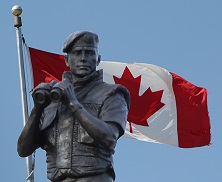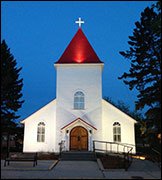True and Fascinating Canadian History
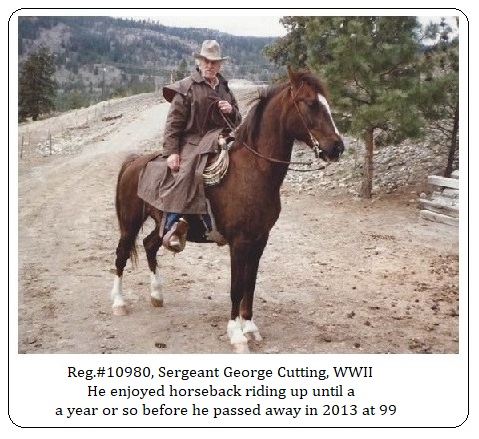
Vet of the Month: September 2013
Reg.#10980, Sergeant George Cutting. WWII
RCMP Vets. Edmonton, AB
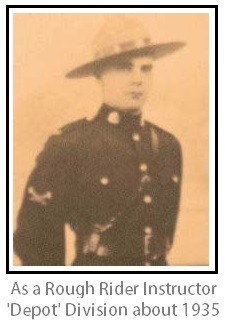
George Arundel Cutting was born to Percy and Ruby Cutting in the Royal Northwest Mounted Police Detachment at Gull Lake, SK., on August 12th, 1914. After a long and good life he passed away at the Kipnes Centre for Veterans in Edmonton, AB., on September 5th 2013.
George’s first ten years of his life were spent on NWMP and RCMP Detachments in Ten Mile (10 miles south of Fort Walsh, SK.), Glen Ewen, Maple Creek and Regina, SK. In 1924 his father retired from the Force (his father was one of the rare members of the combined NWMP, RNWMP and the RCMP). George’s teen years were spent in Maple Creek, SK., Vancouver, BC., and Medicine Hat, AB.
George had a number of interesting incidents during his long lifetime. I will wander about and try to touch on some of the highlights. He is a survivor of the 1918 Spanish Influenza epidemic. He was enlisted in the Force in 1931 at 17 years of age as a Trumpeter -- although he could not play the trumpet at the time.

George quickly learned the trumpet and, at the time of his death, he was the last surviving official Trumpeter of the Force. In those days, trumpeters were required to play over 32 military trumpet calls. If one should read Frank Spalding’s book “Stop The Musical Ride, I want Off ” one would catch one of the events of his career in the RCMP as a trumpeter.
In 1935 George was transferred to Vancouver, BC on general / mounted duties. He was on duty during the Unemployment Riots and he was involved with clearing protestors from the Post Office (at which time he and some others got a fairly heavy dose of tear gas). He was in an early Musical Ride that performed in Vancouver and at the Rose Festival in Portland, Oregon.
Later, George was transferred to Alberta where he was, for a brief period, stationed in Edmonton and Vermilion. He was obviously recognized by this time as a good horseman as he was transferred back to Regina where he was on the mounted escort for King George and Queen Elizabeth’s 1939 tour. After the tour, he was on the Musical Ride at the World’s Fair in San Francisco. After performing there the Ride returned to Regina and then it was on to the National Horse Show in Toronto.
While in Toronto, World War II was declared so the Musical Ride was disbanded and the RCMP members returned to Regina. On his return to 'Depot' there was a bulletin published requesting volunteers for a Reconnaissance Company to represent the Force (as it turned out, this group evolved into the 1st Company Canadian Provost). George was one of the first volunteer and at the time of his death, he was the last of the original members of this Company. By December 17th 1939 the Company were stationed in Scotland.
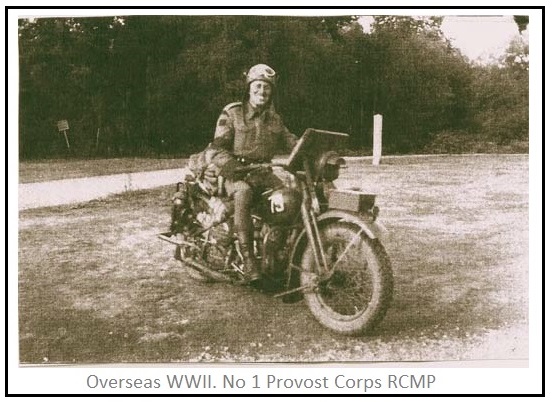
George’s army career was long and interesting. Considerable time was spent on training – George had been a motorcycle rider prior to the Provost Corps so he was one of those tasked with escorting convoys, dispatch riding and doing a number of hazardous jobs. On July 13th, 1940, George was with a portion of the Canadian Army that landed in Brest, France as the country capitulated. The Army hastily got back to England. The next three years were spent on training -- training included sitting in slit trenches firing at strafing German aircraft. While doing motor convoy escorts, he and his motorcycle were hit by a 16 wheeler truck in the dark at an intersection and afterwards he was found treated by a medic who said he was okay and to go and have a cup of tea.
On July 13th 1943 George was in the initial assault on Sugar Beach at Sicily – and in his words, “Lots of excitement and hard riding but we took the Island in I think about 37 days”. While in Sicily, he contracted malaria and after recovery, he had some difficulty in getting back to his Company. From Sicily it was on toItaly. By early September 1943 the Army was marching up through Italy. A lot more excitement and hard riding. He was at Ortona where 4 RCMP were killed and then on to the battles of the Gustav and Hitler lines. There was little fun about the fighting and there were no big headlines. Around March 1944 he began acting as an outrider for Major General Chris Vokes.
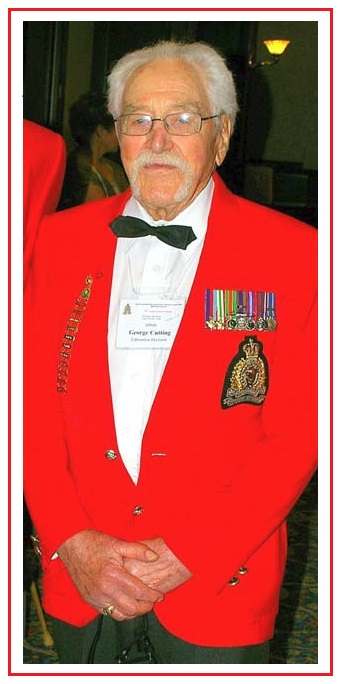
On July 1st 1944, while escorting Vokes, George was involved in a motorcycle accident. He broke his leg and his back. General Vokes visited him in the hospital and tried to get him back on his escort when he was fit again. The Canadian government decided that he had done his share and repatriated him to Canada in February 1945. On his return to Canada, George was stationed at Calgary, Three Hills, and Brooks, AB.
At the end of 1946 George was posted to the Riding Staff at 'Depot' Division – where he was a Rough Rider and an Instructor. He was much loved and admired as a member of the Staff by all the recruits that came in touch with him. This is highlighted by the number of Squad / Troop Reunions he has been invited to (and attended when possible). George retired from the Force in 1958.
George married Ida Isabelle Wright in 1946. They had a good marriage and family life with one son and two daughters (the obituary in the Edmonton Journal outlines his family).
George had many varied interests and talents – he was musical, he liked and could recite poetry, he was well read, he was the Founding Member of a Poker Club In Penticton, BC, he was a Bisley Marksman, he was a motorcycle rider until well into his 80's, he golfed well until the year 2009, he was last on a horse (so far as I know) when he was 95 (he was slightly put out when the horse would not canter), he had an outstanding memory and recall of names, dates and places (and if you were one of his recruits - if he didn’t get your name right away he could name the horse you rode).
George was always a gentleman.
Story and photos by AJH 'Joe' Collinson
RCMP Vets. Edmonton, AB
Reporting from Fort Healy,
J. J. Healy,
September 23, 2013


